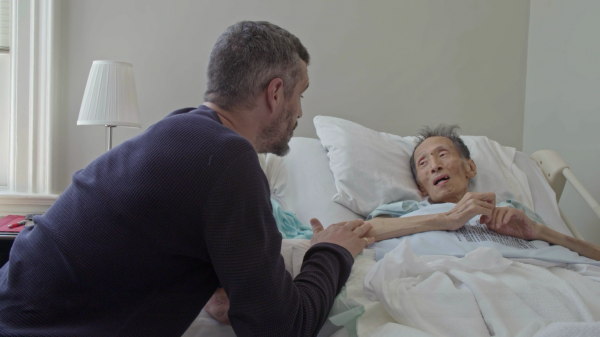Film Review: 2019 Oscar-nominated Best Documentary Shorts — Wrestling With Death
By Gerald Peary
It is safe to predict that the winner in this category will be one of the entries that squares off against mortality.
2019 Oscar-nominated Best Documentary Shorts, screening at Institute of Contemporary Art Boston, Coolidge Corner Theater, and Somerville Theatre.

A scene from the documentary “End Game.”
It’s safe to predict that the Academy Award winner for Best Documentary Short will not be a short at all, but one of the two 40-minute selections, End Game and Lifeboat, which somehow have been slipped into this category. They both have ample time to explore their bone-chilling theme, Wrestling with Death. The three briefer works, mostly worthy, don’t have an Oscar chance.
A Night at the Garden, directed by Marshall Curry, isn’t, as the title might insinuate, the occasion of a legendary boxing match. No, this sharp, frightening 7-minute documentary is a distillation, an editing down, of actual footage of a packed Nazi Bund rally at Madison Square Garden, before Germany had invaded Poland and when the US was officially neutral, two years before we entered the War. Then, Nazis ran free in America to say and do what they wanted. This little historical item is certainly meant to reflect on Trump gatherings, as the 1939 event was billed as a “pro-America rally,” with a blow-up of George Washington behind the speakers’ podium, American flags everywhere. However, the Pledge of Allegiance was led by a German-accented Nazi, Fritz Kuhn, who managed also to jeer at “the Jewish press.” When an anti-fascist gentleman daringly jumped on stage to disrupt the event, he was promptly stomped on by uniformed thugs and then arrested by the New York Police. It could and did happen here.
Black Sheep, directed by Ed Perkins, combines an arresting monologue by Cornelius Walker, a young Nigerian émigré living in Great Britain, with well-done dramatic recreations of his earlier life trying, in questionable ways, to “fit in” to his new country. Walker’s problems occurred when he was a teen and his family moved from London to a hard-nosed, white, and very racist blue-collar suburb. Beat up by the local riffraff, he made a bizarre decision to join up with the worst and trashiest of them, a gang of Caucasian toughs. He dressed like them, he straightened his curly hair, he dyed his skin, he wore blue contacts. And he kicked the shit out of an innocent boy on a bike to impress his peers. “I wanted to be loved. I made friends with monsters,” he confesses. “Smashing houses, smashing cars, I enjoyed it.” But he had an epiphany one day when he joined his white boys in beating up a group of black teenagers.
What is Walker doing now, older and self-aware when he’s being interviewed for the camera? Black Sheep ends abruptly without informing us, so it takes research to learn that he’s a filmmaker.
Period. End of Sentence, directed by Rayka Zehtabchi. This is a pretty amateurish, disorganized documentary, but it landed in the final five Oscar candidates because it has a big heart and a feel-good story. In rural India, both men and women are shown as extraordinarily ignorant of “periods,” and the girls at school blush and choke up asked to talk about them. There’s not a tampon in sight, and the women get by in the primitive way of putting a piece of cloth between their legs at that time of the month, and that cloth is often reused. What can be done? Enter educated Indian women preaching empowerment and a male entrepreneur starting up a company manufacturing cheap sanitary pads. He hires the local women to make them and also to go about selling them. An old-fashioned cheery tale, and with a text at the end asking audiences around the world to contribute to The Pad Project.
Finally, one of these below takes home that Oscar!
End Game, directed by Rob Epstein and Jeffrey Friedman, has the esteemed filmmakers of The Life and Times of Harvey Milk (just Epstein) and The Celluloid Closet (both) making a commissioned film for Netflix. Heavy hitters are in place for this tender, sometimes emotional visit to the palliative care unit of the University of California, San Francisco, Medical Center and its out-patient center for the dying, the Zen Hospice Project. Death could not more kindly stop for its patients than in this converted Victorian-style home where the doctors (all male?) and staff are uniformly patient and empathetic and those passing from this world are all educated, well-bred people, and often self-conscious and philosophical about their fates. There’s even a doctor who assures the relative of a patient that, from what we hear from those who have gone to the undiscovered country and come back, it’s really not bad at all.
Epstein and Friedman cover exactly the same territory as Frederick Wiseman did in Near Death (1989), set at Boston’s Beth Israel Hospital, which was much, much longer and far tougher and with a clientele from all backgrounds and classes. Still, End Game is a powerful work, and it’s very sad for the audience to become intimate with a group of decent, civil people who are on their way out. Even if, as patients of the Zen Hospice Project, you can have a funeral in which your body is sprinkled with flowers.

A scene from the documentary “Lifeboat.”
Lifeboat, directed by Skye Fitzgerald, is a ripped-from-the headlines refugee film, and it’s a harrowing one, showing a series of dramatic rescues by the German non-profit group, Sea-Watch, in the Mediterranean off the coast of Libya. In three days, 3,200 people were pulled from the sea by this heroic organization. But the grim facts about such sea crossovers: one out of 18 drown on this crazy, scary voyage.
It’s often unfathomable to comfortable outsiders that Africans would take a chance climbing onto fragile, clearly sinkable rubber rafts to seek an unknown life in Europe. The film crew interviews those emigrating and sometimes get the expected answer about fleeing for economic opportunity. But what is uncovered also is an outrageous horror in post-Gaddafi Libya which gets little western media coverage. Seemingly, there is a widespread net of kidnapping in Africa with the victims shipped to Libyan prisons. If the relatives can’t pay ransom fees, the imprisoned are raped, murdered, or sold off, boys and girls, as slaves, often for sexual trafficking.
The escapees from Libyan jails quickly run into more traffickers, those who will pack them into unsafe vessels sailing toward Europe for a price. That’s why we see the good people of Sea-Watch ripping apart rubber floats and burning creaky wooden boats, sending these to the bottom of the sea. That way—one small step for mankind!– human traffickers can’t ever use them again.
Gerald Peary is a Professor Emeritus at Suffolk University, Boston, curator of the Boston University Cinematheque, and the general editor of the “Conversations with Filmmakers” series from the University Press of Mississippi. A critic for the late Boston Phoenix, he is the author of nine books on cinema, writer-director of the documentaries For the Love of Movies: the Story of American Film Criticism and Archie’s Betty, and a featured actor in the 2013 independent narrative Computer Chess. He is currently at work co-directing with Amy Geller a feature documentary, The Rabbi Goes West.
